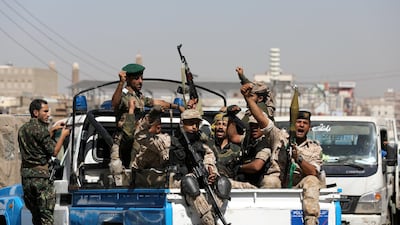Yemen’s internationally recognised government urged Qatar to halt its support for the Iran-backed Houthi rebels on Wednesday.
The country has been mired in conflict since the Houthis pushed the government out of the capital, Sanaa, in late 2014.
“We call on Qatar and the state funded Al Jazeera channel to review its policies and distance itself from the Yemeni bloodshed with mullahs, as history will have no mercy on them,” Yemen’s Minister of Information, Mommar Al Eryani, wrote on Twitter.
Yemen is “exhausted and cannot stand any more adventures,” Mr Al Eryani said, adding that Qatar “is mistaken to believe that it is immune from Iranian expansion.”
Mr Al Eryani said Qatar must review its policies in Yemen.
In response, Doha issued a statement denying its involvement in the country.
“It is better for Al Eryani to direct his media energies to invite regional powers involved in this war to uphold the interest of the Yemeni people,” Qatar’s Foreign Ministry said in a statement.
Mr Al Eryani statement comes as fighting escalated between the Houthis and the coalition-backed Yemeni troops around the strategic northern districts of Al Jouf and Marib on Tuesday.
The Yemeni army “destroyed various Houthi sites and mechanisms in Sarwah, located in western Marib, resulting in the death and injury of many Houthi soldiers,” Saudi Arabia’s state news agency said.
It comes as Saudi Arabia enabled a diplomatic channel with Yemen’s Houthi rebels to try to end the five-year war.
Efforts to end the conflict are being pushed by the UN special envoy to Yemen, Martin Griffiths, who led peace talks more than a year ago in Sweden.
An agreement was reached on a ceasefire in the port city of Hodeidah and a prisoner exchange but hostilities and mistrust stalled the process.
Saudi Arabia's ambassador to Yemen, Mohammed Al Jaber, told The Wall Street Journal this week that Riyadh had been in direct talks with the rebels since last September and invited them to the kingdom.
The invitation for talks in the country was “undertaken at the request” of the UN envoy, Mr Al Jaber said.
"This is part of Martin Griffiths's process," a western diplomat told The National.
Yemen’s internationally recognised government and the Houthi rebels welcomed an agreement to de-escalate the conflict last Thursday to battle the spread of the coronavirus in the region.
Yemen has not officially recorded any cases of the virus.
The agreement follows a surge in violence at the weekend.
Saudi Arabia said it intercepted two ballistic missiles aimed at Riyadh and Jizan at the weekend, part of a drone and missile attack by the Iran-backed rebels.
Yemen’s government believes that Iran instructed the rebels to attack Saudi Arabia.
“The Houthis turned against our [ceasefire] agreement at the instructions of Iran and aborted all the concessions made by the government to end the war,” Mr Al Eryani said.
In response, the Saudi-led Arab Coalition in Yemen launched strikes on Monday against rebel military bases in Sanaa.
But Saudi Arabia’s ambassador said that talks are still on the table.
Mr Al Jaber said the Saudi-led coalition strikes on Sanaa were not intended to cause a flare-up in hostilities but were in response to the rebels’ missile attacks.
“We are committed to our de-escalation,” Mr Al Jaber said.
“We are ready to have a ceasefire in all Yemeni territory if they accept it.”
He said direct talks have been held with the rebels since last September after they vowed to stop strikes on Saudi territory,
It followed attacks on major Saudi oil plants last year.
The group still controls most major urban centres despite years of war.


